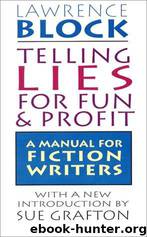Telling Lies for Fun & Profit by Lawrence Block & Sue Grafton

Author:Lawrence Block & Sue Grafton [Block, Lawrence & Grafton, Sue]
Language: eng
Format: epub
Tags: Language Arts & Disciplines, Reference, Writing Skills, Composition & Creative Writing, General, Non-Fiction, Self Help
ISBN: 9780688132286
Publisher: HarperCollins
Published: 1994-02-25T00:00:00+00:00
CHAPTER 24
Opening Remarks
ANYONE WHO starves in this country deserves it.
Relax. The above is not this author's sociopolitical opinion. It is, rather, the opening sentence of the first short story of mine to see print, published in Manhunt just a year or two after Grant took Richmond. The story wasn't a bad one, but no one could call it the greatest ever told. I suspect its opening lines had a great deal to do with its acceptance for publication.
Well, openings are always important. Writers of non-fiction are well aware of the importance of getting things off to a good start. In a straight news story, the lead is literally everything, embodying in a sentence or two the who-what-where-when-why-how of it all. In a magazine article the lead is no less vital, although there may be less urgency about jamming all the facts at the reader right off the bat. In any event, the lead has the job of catching the reader's attention, involving him in the story, and establishing that the paragraphs to follow will be sufficiently useful and interesting to warrant his reading them.
Short stories and novels have leads, too, and their openings perform much the same functions. It's said that you never get a second chance to make a good first impression, and that old bromide is as valid in fiction as it is in life itself. And, in fact as in fiction, a good first impression is essential.
I think this is even more the case for the beginner than for the established professional. When an old pro submits a story, the editor who reads it knows who wrote it. It's brand-name merchandise. Even if the first paragraph's a wee bit blah, the editor knows the story's likely to get better as it goes along. He may well wind up rejecting it?old pros get rejected left and right, just like everybody else?but at least he'll probably read it all the way through.
The beginner, coming in cold over the transom, had better connect in the first paragraph. Because that is very often all an editor will read. Anyone who's read slush will tell you that it is a fundamentally unpleasant way to spend one's time, and that only a masochist reads unpublishable material through to the end. Editors are a busy lot, and it's essential that they wade through the slush as quickly as possible.
Your story, of course, is not garbage, to be returned unread to whence it came. And, while every sentence you write must be designed to convey this message to the reader, the first sentences have the most work to do.
Such as?
1. GETTING THE STORY MOVING. The worst thing about the openings of most stories by new writers is that they take more time getting started than an old Studebaker on a cold morning. This flaw was very much in evidence among the entries in the Writer's Digest short-story contest; I couldn't tell you how many stories began with the lead character getting out of bed, taking
Download
This site does not store any files on its server. We only index and link to content provided by other sites. Please contact the content providers to delete copyright contents if any and email us, we'll remove relevant links or contents immediately.
Kiss My Asterisk by Jenny Baranick(1213)
The Only Grammar Book You'll Ever Need: A One-Stop Source for Every Writing Assignment by Thurman Susan(1203)
Writing CopyFor Dummies by Jonathan Kranz(1195)
BRADBURY, Ray by Zen in the Art of Writing (pdf)(970)
English Verb Tenses Up Close by Mark Lester(944)
Writing Fiction by Gotham Writers' Workshop(915)
The Copywriter's Handbook by Robert W. Bly(787)
It's Never Too Late to Begin Again by Julia Cameron(770)
Telling Lies for Fun & Profit by Lawrence Block & Sue Grafton(744)
crafting dynamic dialogue by editors writers digest(741)
The Psychology Workbook for Writers by Darian Smith(740)
How to Not Write Bad by Ben Yagoda(715)
The Grammar Devotional by Mignon Fogarty(709)
The Book of Ruby(678)
100 Successful College Application Essays by The Harvard Independent(660)
Writing Tools: 50 Essential Strategies for Every Writer by Roy Peter Clark(646)
Steal This Plot: A Writer's Guide to Story Structure and Plagiarism by William Noble & June Noble(625)
How to write Science fiction and Fantasy by Orson Scott Card(611)
Inland by Gerald Murnane(608)
